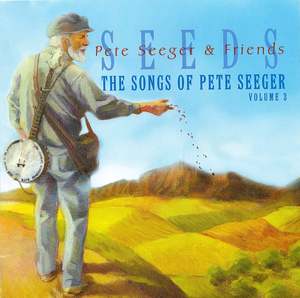
Seeds: The Songs of Pete Seeger, Vol. 3
produced by Jim Musselman; performed by Pete Seeger, 1919-2014 (Appleseed, 2003), 1 hour 58 mins, 35 page(s)
Details
- Field of Interest
- American Music
- Content Type
- Music recording
- Duration
- 1 hour 58 mins
- Recording Engineer
- David Glasser, fl. 1975
- Format
- Audio
- Sub Genre
- Folk Revival
- Label
- Appleseed
- Page Count
- 35
- Performer
- Pete Seeger, 1919-2014
- Producer
- Jim Musselman
- Release Date
- 2003
- Review
- In his 60-some years as a public performer, Pete Seeger has left an indelible footprint on popular music. As a member of the Almanac Singers (with Woody Guthrie, Lee Hays, and Millard Lampell) in the 1940s and the Weavers (again with Lee Hays, as well as Fred Hellerman and Ronnie Gilbert) a decade later, Seeger helped midwife the urban folk boom of the 1960s. His comfortable voice and graceful banjo style give his many compositions and folk adaptations an easy and elegant dignity. Seeds is the third in a trilogy of double-disc albums that feature songs either written or arranged by Seeger, with the spotlight this time on previously unreleased material, most of which is on the first disc. As a writer, Seeger has long been a master of protest songs, whimsical songs, and songs of unbridled optimism, and "Trouble at the Bottom," "English Is Cuh-ray-zee," and "Flowers of Peace" (sung to the gorgeous melody of "Wild Mountain Thyme") are welcome additions to his body of work. "Estadio Chile," the horrifying story of the great Chilean singer Victor Jara, is simply an unforgettable song, if painful to hear because of the cruelty it has to bear. The final song on the first disc, "Sailing Down My Golden River," recorded with the assistance of David Gilmour (of Pink Floyd fame) and orchestrated by Michael Kamen, functions as a sort of elegant autumnal statement from Seeger. The songs on the second disc are sung by contemporary folk artists who share an affinity to Seeger's work and include some of his most famous tunes, including Dick Gaughan's slow, stark, synthesizer-colored version of "Bells of Rhymney" and Natalie Merchant's powerful take on "Which Side Are You On," a song written by Florence Reece but popularized by Seeger and sung at many union gatherings. ~ Steve Leggett, All Music Guide
- Subject
- American Music, Music & Performing Arts, American Studies, Folk Music, Música Folk
- Keywords and Translated Subjects
- Música Folk
